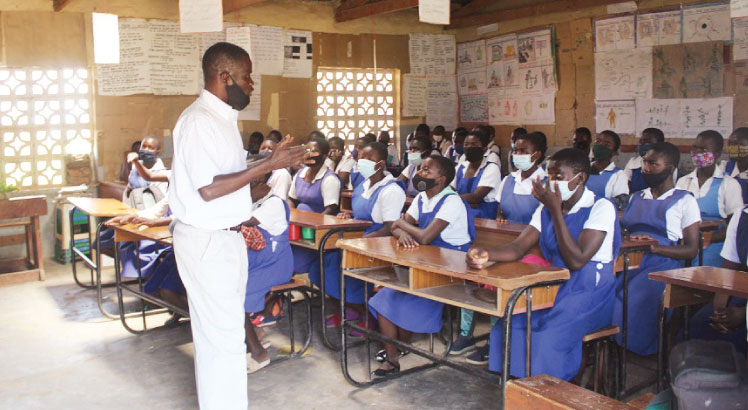Ground is shifting as Chakwera chalks victories
Since September this year, President Lazarus Chakwera has been chalking major victories.
And if he maintains the momentum, he and his Tonse Alliance partners might just reclaim the narrative, turnaround the country’s economic fortunes, rebuild the eroded political capital and crawl back the popular wave that catapulted them into power. Last month, the Chakwera administration won the United States Millennium Challenge Corporation (MCC) second compact, securing a new $350 million (about K360 billion) package having done well in the compact’s scores in the 2022 fiscal year.
While the country struggled on key areas under Economic Freedom, specifically on fiscal policy, inflation and business start-up, Malawi was above average on regulatory quality, trade policy, gender in the economy, land rights and access although it is average on access to credit.
On ruling justly, Malawi was in the excellent category in almost all areas, including control of corruption, political rights, civil liberties, rule of law, and freedom of information and has a strong pass on government effectiveness.
On investing in people, Malawi’s scores were largely above average, especially on health and primary education expenditures, natural resources protection, immunisation rates, girls primary education completion rates and child health, which has a strong pass, but needs rapid improvement.
In fact, the US government was effusive in its praise. Speaking at a Democracy Delivers event hosted by United States Agency for International Development (Usaid) administrator Samantha Power in New York where Chakwera went to attend the 77th Session of the United Nations General Assembly, US Secretary of State Anthony Blinken said Chakwera was doing all he can to ensure the fight against corruption is strengthened, declaring: “America will do all it can to support governments that govern justly”.
In her speech, Power said: “He [Chakwera] has embraced the agenda of fighting corruption while focusing on developing Malawi’s agriculture, mining and tourism sectors.
“Due to recent advances, Malawi will soon sign an MCC compact that offers it significant new resources. MCC calls Malawi one of the best performers on its political and economic scorecard and I spoke with President Lazarus Chakwera about how Usaid can support further gains.”
Just last Friday, the Chakwera administration reached a staff-level agreement with the International Monetary Fund (IMF) on a Rapid Credit Facility through the IMF’s new Food Shock Window and Programme Monitoring with Board involvement (PMB) to help restore macroeconomic stability and provide the foundation for an inclusive economic recovery.
With that deal, Lilongwe unlocked up to $88.3 million in emergency financing that should help ease the balance of payment pressures that have birthed foreign currency shortages, leading to the country’s failure to pay for critical imports such as fuel, drugs and fertilisers.
According to Reuters, Malawi would be the first African country to receive special IMF financing to deal with the global inflation crisis, with funds set to help address urgent balance of payments needs, support economic adjustment and structural reforms.
In chalking this victory, the administration may have demonstrated that they are improving on fiscal policy and, specifically, that its public finance and economic management efforts are bearing fruits.
If sustained, the staff-level agreement is likely to be the stepping stone to a substantive economic programme with the fund—the Extended Credit Facility—which is crucial to enticing other donors to reconsider the aid freeze they placed on Malawi well before the Tonse administration came onto the scene.
Meanwhile, the arrival of the European Union (EU) Commissioner for international partnerships Jutta Urpilainen on Thursday to engage the Malawi Government and other stakeholders and also sign six financing agreeements with Lilongwe covering new programmes supporting the energy sector, green growth initiatives, democratic governance, access to justice and food production and reliance of food systems, is a strong signal that the country might just be onto something good finally.
Remember that in January this year, the EU signaled that it had put back on the table the possibility of resuming general budgetary support to Malawi nearly 10 years after donors—disgusted by the high level fraud and corruption along the country’s public finance and economic management system that climaxed into the so-called Cashgate in 2013 when more than K20 billion was looted from Treasury within six months—stopped budgetary support.
Something tells me that should the EU return to direct budgetary support, it could trigger resumptions even from hitherto reliable bilateral donors such as the United Kingdom and Norway to support the works of multilateral bodies such as the World Bank and the African Development Bank that have been cautiously helping even when the Western capitals had shut its doors in Malawi’s face.
Get me right, things will not improve overnight. Commodity prices will keep rising in the foreseeable future. Forex shortages and fuel queues will not suddenly be wiped out. Corruption and pilferage of public funds will not just disappear today.
But clearly, the ground is shifting; something is changing for the better and as citizens, we should maintain the pressure on the administration to do better.
And President Chakwera must sustain this good run of his for his sake and most, importantly, the good of the country and its wonderful, hardworking citizens.





